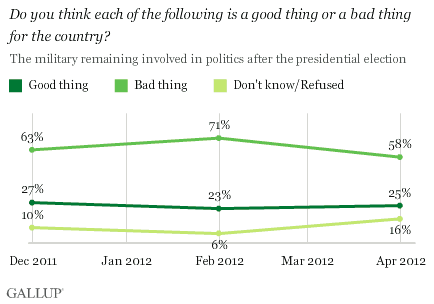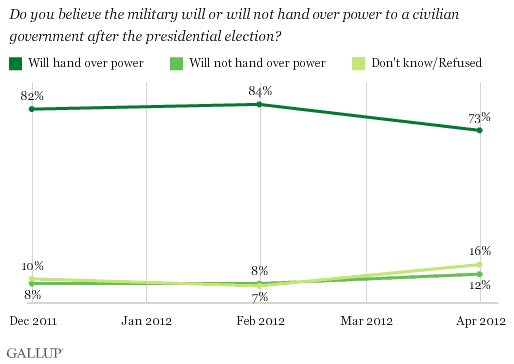WASHINGTON, D.C. -- A majority of Egyptians in April told Gallup that it would be a "bad thing" for their country if the military remained involved in politics after the presidential election, a role that many expect the military will continue after the latest political changes in the country.

Majorities of Egyptians have felt this way about the military's role since December 2011. Even so, the Supreme Council of the Armed Forces this week amended the March 2011 constitutional declaration to give it sweeping control -- including legislative powers -- after Egypt's courts dissolved the country's parliament.
Majorities of Egyptians have also consistently believed that the military council would cede power to a civilian government after the country has elected a new president. The council said it will still keep that promise, despite its latest declaration that it will significantly curtail the president's executive powers until a new parliament is elected and a constitution is written.

The new constitutional addendum also gives the military council authority to convene the constituent assembly tasked with drafting the country's new constitution, although fewer than one in five Egyptians supported this role for the council in April this year.
Implications
After a turbulent 15 months since Egypt's revolution, the country witnessed the dissolution of the only body democratically elected to office. The country's ruling military council has now positioned itself to play a major role in the country's legislative, constitutional, and executive affairs for at least months to come -- despite the public's desire for the contrary. Council members said in a recent press conference that the new constitutional addendum was necessary to balance the powers between the executive branch and the now vacant legislative branch of government. Others have described the latest move as a military coup aimed at slowing down Egypt's transition to democracy.
Since former President Hosni Mubarak's resignation, the Egyptian public has expressed high levels of confidence in the military council that has ruled the country in the interim period, measuring 83% confidence in April. These perceptions highlight that despite a high level of confidence in the council as an institution, many Egyptians see their continued political role as problematic. It will be interesting to see whether the council's latest move will seriously erode confidence in the institution. A perceived political overreach or "power grab" by Islamist parties in the past months resulted in a noticeable decline in support for Islamist groups in the lead up to the first round of the presidential election. It is yet to be seen whether the council's latest political maneuvering will have a similar outcome in the near future.
For complete data sets or custom research from the more than 150 countries Gallup continually surveys, please contact SocialandEconomicAnalysis@gallup.com or call 202.715.3030.
Survey Methods
Results are based on face-to-face interviews with 1,074 adults, aged 15 and older, conducted April 8-15, 2012, in Egypt. For results based on the total sample of national adults, one can say with 95% confidence that the maximum margin of sampling error is ±3.4 percentage points. The margin of error reflects the influence of data weighting. In addition to sampling error, question wording and practical difficulties in conducting surveys can introduce error or bias into the findings of public opinion polls.
For more complete methodology and specific survey dates, please review Gallup's Country Data Set details.
